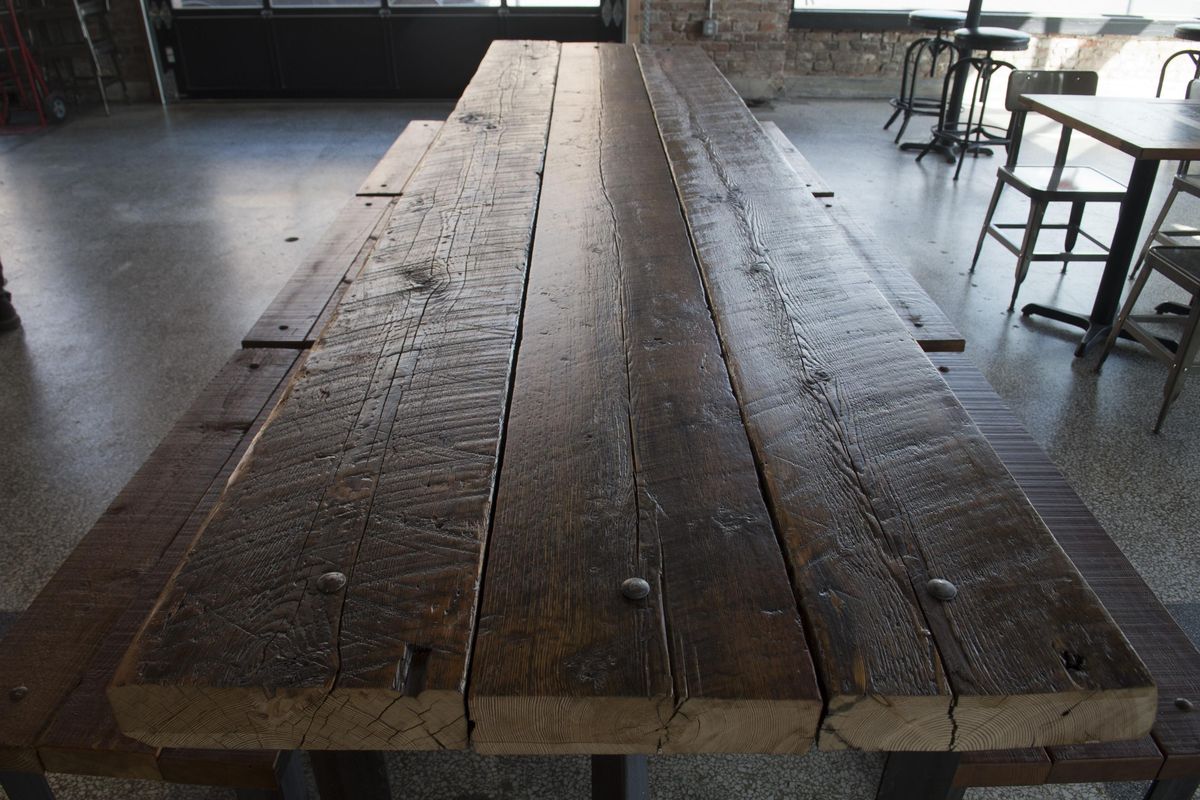Landmarks: 1920s auto shop is home to Iron Goat Brewing

When the Transport Truck Company of Mount Pleasant, Michigan, opened its Northwest Transport Truck Co. in Spokane in 1921, it did so in a newly constructed building designed with a showroom, parts room, offices and service shop, all described in a newspaper article as “one of the finest homes in the northwest to be used for the sale and service of trucks.”
The one-story, 50-foot by 140-foot building at 1302 W. Second Ave. joined with a number of modern structures built in the early 1920s in the western part of downtown Spokane, between Sprague and Second avenues, designed to service the new and rapidly growing automotive business. In the entire state there were only some 9,300 registered motorized vehicles in 1910, but it was 137,000 in 1921 and 460,000 in 1934.
The Michigan company had begun advertising its farm and commercial vehicles in the region in1920, even before its local building was constructed. Some of the other buildings erected in the area that became known as Auto Row are still selling and servicing cars and trucks today, but others, like this one at the corner of Second and Cedar Street, have moved on to other purposes. Even so, it remains a contributing property in the West Downtown Transportation Corridor on the National Register of Historic Places. In its own right, it was listed on the Spokane Register of Historic Places in 2015.
The Northwest Transport Truck building has three bays along the front and nine along the east side, all of which are glass-paneled, including the large overhead doors, which let in light and give it a spacious and open feel. But as heralded as the building’s opening was, the company only occupied the site for two or three years, making way for other industry-related businesses and, eventually, other businesses altogether.
Today it is the home of the Iron Goat Brewing Co. The front area, where the showroom had been, is now the taproom and restaurant, and behind it, where the vehicular service area had been, is the brewery.
Partners in Iron Goat – Greg and Heather Brandt, Sheila Evans and Paul Edminster – had a brewery near Trent Avenue and Napa Street, but needed more room. They happened by the vacant and semi-derelict brick building in the fall of 2014 and peered in. Looking past the debris, oily floors and insulation hanging from the ceiling, they believed this could be their new home.
A lot of hard work and remodeling yielded surprises and delight, and in the spring of 2016, Iron Goat opened its doors there, serving food and up to 24 of its own crafted beers.
It was clear the building had suffered some hard years. At some point, the exterior had been painted gray – the bricks, most of the widows and pretty much everything. Floors ended up black from oil and grease. Over the years, it had been home to Modern Automotive and Tractor School, Chrysler Motor Cars Sales and Service, Modern Paint and Body Works, Ben’s Trim Shop, a public garage, Inland Bolt and Motors, Empire Radio Service, an upholstery shop, Utter Motor delivery depot and Midas Muffler.
Breaking the automotive chain of businesses in the building was Betty’s Café in the mid-1930s. The longest occupant of the building was Jones Automotive Engines, which rebuilt engines there from 1978 to approximately 2010.
What the Iron Goat partners did, according to Greg Brandt, was gut the building. They wanted to keep a sense of history in the structure, so they took the walls down to the exposed exterior brick and left the original ceiling boards and trusses open. When removing the black oil that covered the showroom floor, they discovered terrazzo underneath, which they have preserved. They had a replica overhead door constructed for Bay 7 in the brewery area and took two of the paned panels from the original door and created from them two sliding doors on either side of the bar leading from the taproom into the brewery.
They used wood from removed rafters to make long tables and benches and otherwise worked to keep something of a vintage industrial feeling inside Iron Goat. In the process of renovation they discovered two in-floor safes, one of which was removed, and the other remains in place, still unopened.
When digging to install electrical lines at the back corner of the building, in the former service area, they discovered the dump site for a house that had stood there in the late 1800s. “We unearthed a number of old whiskey, medicine and other bottles and have held on to them,” said Paul Edminster.
They keep the dusty old bottles in an office, as a reminder of the history of the landmark building that is home to their business.